2023届高考英语专题复习定语从句、名词性从句、状语从句课件 (40张ppt)
文档属性
| 名称 | 2023届高考英语专题复习定语从句、名词性从句、状语从句课件 (40张ppt) |
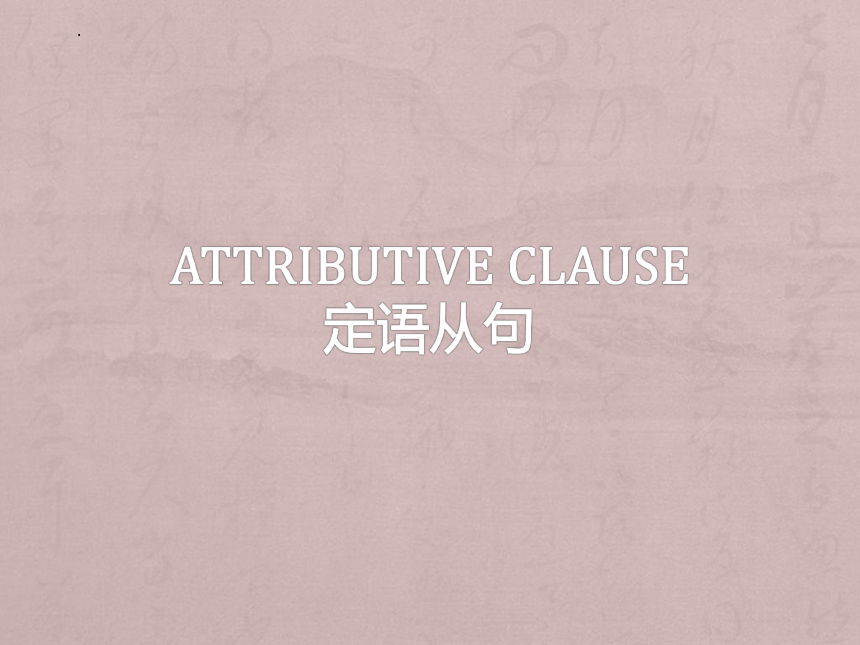
|
|
| 格式 | zip | ||
| 文件大小 | 255.5KB | ||
| 资源类型 | 教案 | ||
| 版本资源 | 通用版 | ||
| 科目 | 英语 | ||
| 更新时间 | 2023-01-16 10:19:52 | ||
图片预览

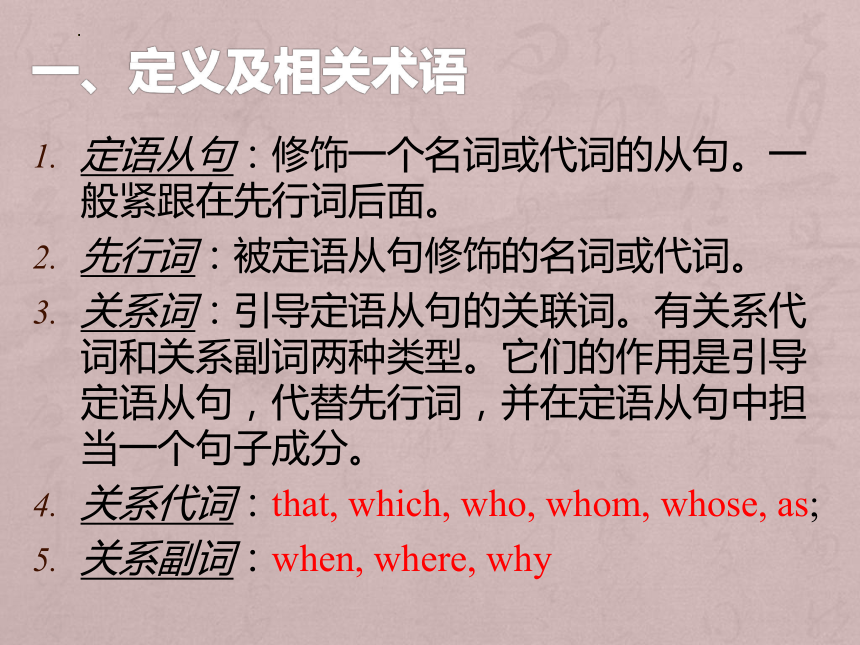

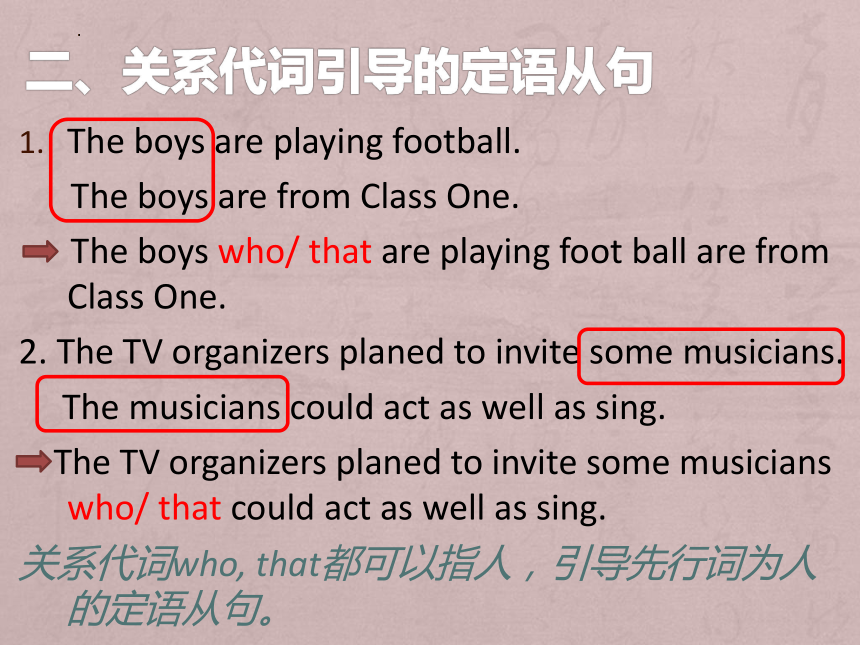
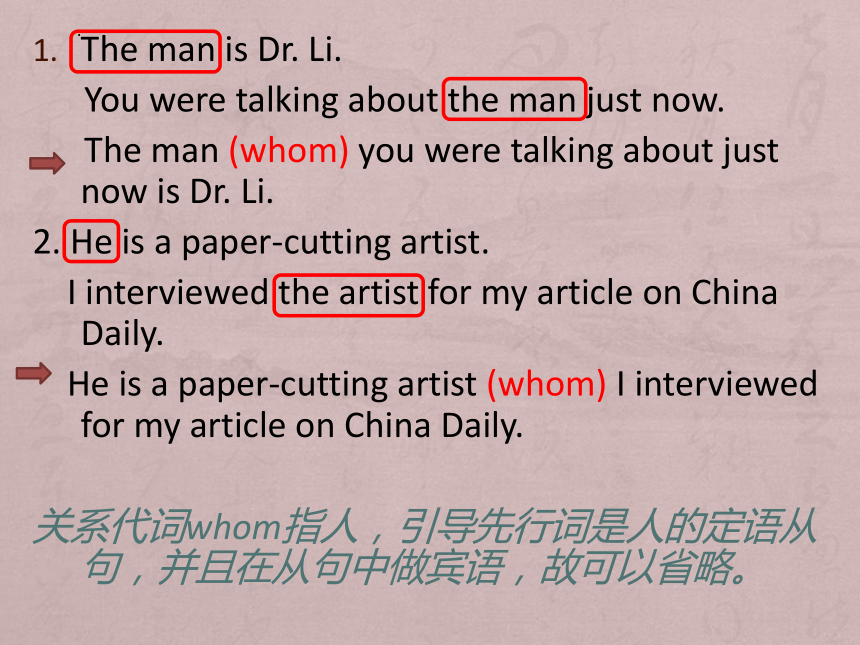


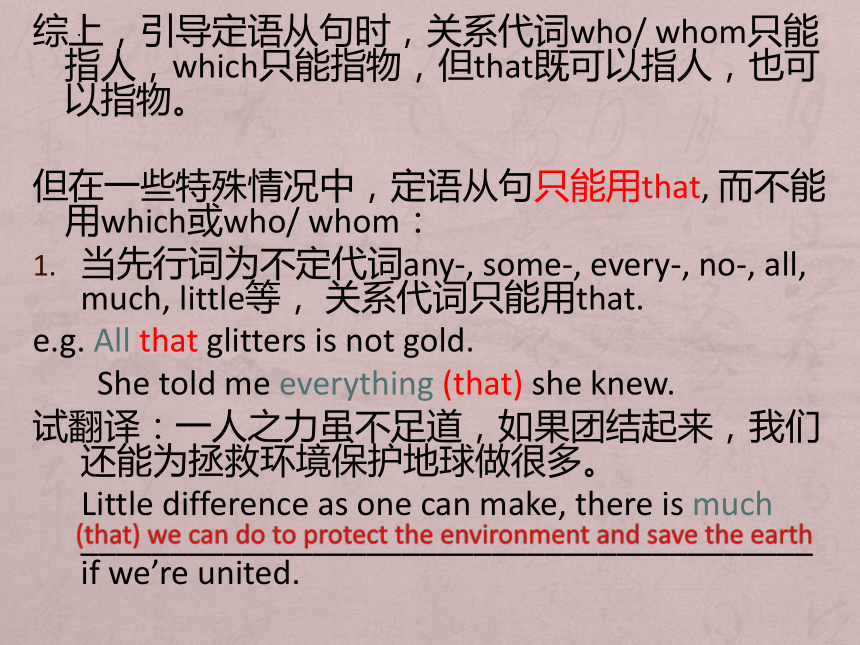
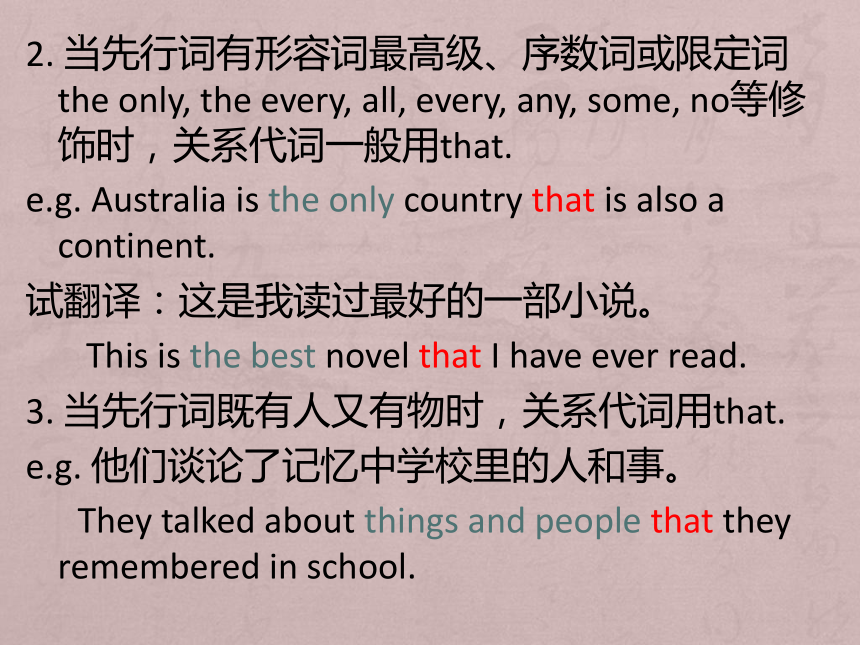
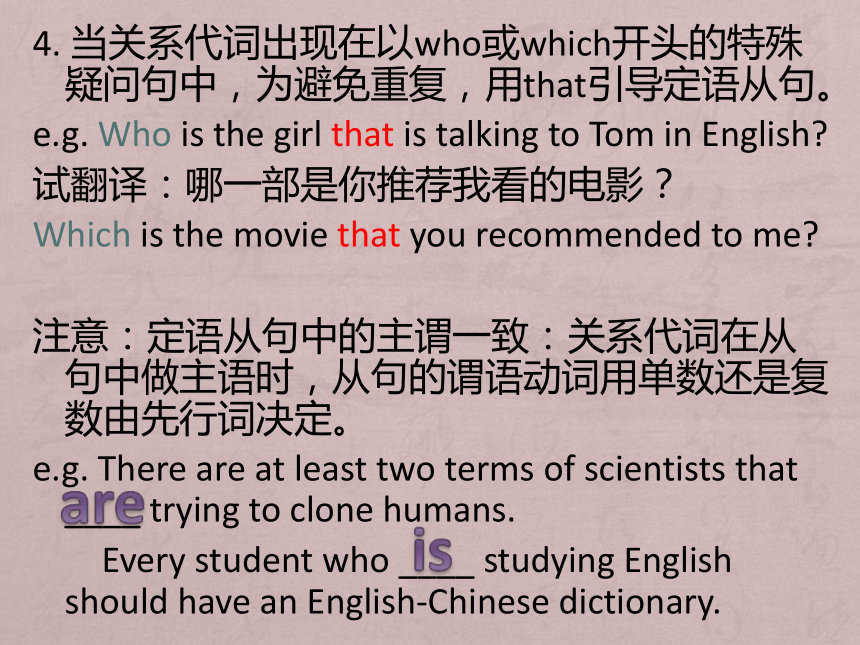


文档简介
(共40张PPT)
attributive clause
定语从句
一、定义及相关术语
定语从句:修饰一个名词或代词的从句。一般紧跟在先行词后面。
先行词:被定语从句修饰的名词或代词。
关系词:引导定语从句的关联词。有关系代词和关系副词两种类型。它们的作用是引导定语从句,代替先行词,并在定语从句中担当一个句子成分。
关系代词:that, which, who, whom, whose, as;
关系副词:when, where, why
翻译句子,找出其中的定语部分,如果有定语从句,指出先行词和关系代词。
e.g. She drives a new car.
She drives a car that her father gives her as a birthday present.
Due to the changeable weather, Wuhan is a city where you can experience four seasons in a day.
__
____________
_______
先行词
关系代词
_____________________
先行词
关系副词
二、关系代词引导的定语从句
The boys are playing football.
The boys are from Class One.
The boys who/ that are playing foot ball are from Class One.
2. The TV organizers planed to invite some musicians.
The musicians could act as well as sing.
The TV organizers planed to invite some musicians who/ that could act as well as sing.
关系代词who, that都可以指人,引导先行词为人的定语从句。
The man is Dr. Li.
You were talking about the man just now.
The man (whom) you were talking about just now is Dr. Li.
2. He is a paper-cutting artist.
I interviewed the artist for my article on China Daily.
He is a paper-cutting artist (whom) I interviewed for my article on China Daily.
关系代词whom指人,引导先行词是人的定语从句,并且在从句中做宾语,故可以省略。
Much attention has been paid to the Marathon.
The Marathon will start from the River Beach in Hankou.
Much attention has been paid to the Marathon which/ that will start from the River Beach in Hankou.
2. Jogging is a habit.
It helps shape your body.
Jogging is a habit which/ that helps shape your body.
关系代词which, that都可以指物, 引导先行词为物的定语从句。
Rescuers built shelters for the survivors.
The survivors’ homes had been destroyed in the earthquake.
Rescuers built shelters for the survivors whose homes had been destroyed.
2. The door of the classroom is broken.
The classroom will be repaired soon.
The classroom whose door is broken will be repaired soon.
关系代词whose表示“谁的”,可以指代人或物的,故可引导先行词为人或物的定语从句。
综上,引导定语从句时,关系代词who/ whom只能指人,which只能指物,但that既可以指人,也可以指物。
但在一些特殊情况中,定语从句只能用that, 而不能用which或who/ whom:
当先行词为不定代词any-, some-, every-, no-, all, much, little等, 关系代词只能用that.
e.g. All that glitters is not gold.
She told me everything (that) she knew.
试翻译:一人之力虽不足道,如果团结起来,我们还能为拯救环境保护地球做很多。
Little difference as one can make, there is much _________________________________________ if we’re united.
(that) we can do to protect the environment and save the earth
2. 当先行词有形容词最高级、序数词或限定词the only, the every, all, every, any, some, no等修饰时,关系代词一般用that.
e.g. Australia is the only country that is also a continent.
试翻译:这是我读过最好的一部小说。
This is the best novel that I have ever read.
3. 当先行词既有人又有物时,关系代词用that.
e.g. 他们谈论了记忆中学校里的人和事。
They talked about things and people that they remembered in school.
4. 当关系代词出现在以who或which开头的特殊疑问句中,为避免重复,用that引导定语从句。
e.g. Who is the girl that is talking to Tom in English
试翻译:哪一部是你推荐我看的电影?
Which is the movie that you recommended to me
注意:定语从句中的主谓一致:关系代词在从句中做主语时,从句的谓语动词用单数还是复数由先行词决定。
e.g. There are at least two terms of scientists that ____ trying to clone humans.
Every student who ____ studying English should have an English-Chinese dictionary.
are
is
三、关系副词引导定语从句
It is a time.
In the time there are many innovations changing our life.
It is a time when there are many innovations changing our life
2. Occasions are quite rare.
On these occasions, I have the time to spend a whole day with my kids.
Occasions are quite rare when I have the time to spend a whole day with my kids.
关系副词when在定语从句中做时间状语,定语从句修饰的是表示时间的名词。
Ancient China was a place.
States were often at war with each other in the place.
Ancient China was a place where states were often at war with each other.
2. What are the situations
Body language is the only form of communication
in the situations.
What are the situations where body language is the only form of communication
关系副词where引导定语从句时,在从句中做地点状语,定语从句修饰的是表示地点的词,也可以是表抽象空间概念的名词,如case, situation, position, stage, point等。
注意:选择正确的关系词,关键在于搞清楚关系词在定语从句中充当什么成分。关系词在从句中做主语或宾语时,应该用关系代词;关系词在从句中做状语时,应该用关系副词。
e.g. I returned to the city ________ I visited last year.
I returned to the city ________ I grew up.
I will never forget the days ________ we spent together.
I will never forget the days ________ we worked together.
(which/ that)
where
(which/ that)
when
1. The reason is to ask you whether you have got my e-mail.
I’m calling you for a reason.
我打电话给你的原因是询问你是否已收到了我的邮件。
The reason why I’m calling you is to ask you whether you have got my e-mail.
2. Do you know the reason
He can’t join in the family gathering again for a reason.
你知道他又不能参加家庭聚会的理由吗?
Do you know the reason why he can’t join in the family gathering again
注意区分reason引导的同位语从句:
(He will be engaged in business entertainment at that time.)
他又不能参加家庭聚会的理由是他那时要忙着工作应酬。
He can’t join in the family gathering again for the reason that he will be engaged in business entertainment at that time.
关系副词why引导定语从句,修饰的是表示原因的名词reason,关系副词why在定语从句中作原因状语。
四、“介词+关系代词”引导定语从句
关系副词when, where, why引导的定语从句,根据具体句意都可以转化为“介词+关系代词”。
“介词+which”引导定语从句,修饰指物的先行词;
“介词+who/ whom”引导定语从句,修饰指人的先行词
that前不能接介词。
Is this the school where you studied ten years ago
We went through a period when communications were very difficult in the rural areas.
My father explained the reason why he scolded me.
I made a list of the people.
I had received donations from them.
我列了一张名单,列出我收到过捐赠的人。
I made a list of the people from whom I had received donations.
in which
in which
for which
“介词+关系代词”结构中,介词的使用要遵循两个原则:
1)根据从句中的谓语动词与先行词的习惯搭配:
e.g. 我们在找钱包的主人。
We are looking for the person to whom the purse belongs.
这就是他终身致力研究的理论。
This is the theory to which he devoted all his life.
注:先行词为way(方式)时,关系代词可以用that/ in which,或直接省略。
e.g. I don’t like the way (that/ in which) you talked to me.
练习:
1. 阅读是个好习惯,我从中受益良多。(benefit from)
Reading is a good habit, from which I benefit a lot.
2. 家人是与你分享快乐和悲伤的人。(share…with…)
Families are people with whom you share happiness and sorrow.
注:这种搭配只能在动词短语中使用。如:look after, take care of, cut down, break in, etc.
e.g. Mary在照顾的那个人是她的祖父。
The man (that/ whom) Mary is looking after is her grandfather.
练习:这是我正在找的那本书。(look for)
This is the book (that/ which) I’m looking for.
2)根据介词与先行词的习惯搭配:
e.g. He wrote a book in which the original image of submarine was shown to the world.
他写了一本书,书中潜水艇的原型第一次展现在世人面前。
The old man was talking to Mr. Smith, in whose hospital I was operated on.
那个老人正在和Smith先生说话,我在他的医院做过手术。
What is the youngest age __________ a person can be employed
可以受雇的最低年龄是多少岁?
at which
注:“介词+关系代词”结构扩展:
e.g. 五位评委听了你的演讲,他们都认为你的演讲是今年最好的。
Your speech was heard by a group of five judges, all of whom agreed that it was the best one this year.
练习:
1. 法律限制了面具的使用,这最早可以追溯到14世纪。
The use of masks was limited by laws, ___________ dates back to the 14th century.
2. 她带了她的三个朋友来,我之前都没有见过。
She brought with her three friends, _____________ I had ever met before.
the first of which
None of whom
五、限定性定语从句与非限定性定语从句
句式区别:主从句有无“,”隔开;
非限定性定语从句中,关系代词作宾语时不可省略,并且不能由关系代词that引导;
语意及句子意思完整度的区别:
试比较:His brother who is nineteen years old is serving in the army now.
His brother, who is nineteen years old, is serving in the army now.
六、as引导的定语从句
as引导的限定性定语从句:
as…as…
e.g. 你想要多少书都可以拿走。
You may take as many books as you want.
此结构否定句常用so…as…:
Once you get down to the issue, you’ll find it not so thorny a problem as it is thought to be.
2.As 引导非限定性定语从句指代主句的内容,在从句中作主语或宾语。
e.g. As I have pointed out, it is important to include vegetables in our diet.
名词性从句
noun clause
定义:名词性从句相当于名词,可分别作主句的主语,表语,宾语和同位语。
主语从句
1.连接词that, whether引导
e.g. It is not clear _whether__ the financial crisis will soon be over.
2.连接代词引导:what, which, who, whose, whatever, whichever, whoever
e.g. _what___ was the most important to her, she told me, was her family.
__whoever___ wants to stay in a hotel has to pay their own way.
3.连接副词引导:when, where, why, how
e.g. _why__ they suddenly disappeared still remains a mystery.
4.It作形式主语:主句从句位于句末,保持句子平衡。
e.g. It is still unknown when the financial decision will be made.
It is a fact that English is being accepted as an international language.
Tip: what引导的主语从句一般不用it作形式主语。
表语从句
1.位于系动词之后充当表语
2.连接词that, whether, because引导
e.g. If I’m a bit sleepy, it’s because I was up all night.
Tip: 当句子主语为reason时,表语从句一般由that引导,不能用because。 The reason why … is that…
3.连接代词what, which, who, whose.
e.g. Engines are to machines what hearts are to animals.
固定句型:A is to B what C is to D.
4.连接副词when, why, where, how引导
e.g. That’s where I first met her.
5.As though/as if (似乎,仿佛)引导通常放在be, look, seem, sound, feel等系动词后。
e.g. It was as if I had known you for many years.
宾语从句
1.连接词that, whether, if引导(if位于句首时只能引导条件状语从句)
一般情况下whether和if可以互换,以下情况除外:
a.从句作介词宾语时,用whether
e.g. That depends on whether you are suitable for this job.
b.固定搭配:whether … or not
e.g. I don’t know whether he will come or not.
2.连接代词what, which, who, whose, whoever, whichever, whatever
e.g. I will do whatever I can (do).
3.连接副词when, where, why, how引导
e.g. Do you know when the Olympic games began
4.It作形式宾语:宾语从句放在宾语补足语之后。
主语+动词+it+宾补+宾语从句
e.g. He didn’t make it clear when and where the meeting would be held.
同位语从句
1.定义:对前面的名词进行进一步解释,在句中担当同样的语法位置。
2.同位语从句常放在fact, news, idea, thought, hope, belief, truth, doubt, suggestion, warning, feeling, reason等名词后。
3.同位语从句和定语从句的区别
e.g. I still remember the day when I first came to Beijing.
I have no idea when he will be back.
状语从句
adverbial clause
一.定义
在复合句中作状语的句子叫做状语从句。状语从句可位于主句前,也可位于主句之后。状语从句可表示时间、地点、原因、结果、条件、方式、让步、比较、目的等。
主要考察连词的运用。从属连词一般不充当成分。
时间状语从句
一.常见从属连接词
When, whenever, since, after, as, while, before, as soon as, till, until, once, no sooner… than
e.g. As soon as I hear my alarm clock, I jump out of my bed.
Once she has made up her mind, nothing can change it.
Peter was so excited ___ he received an invitation from his friend to visit China.
a. Where b. that c. why d. when
b
When,while和as 的区别
1.When 可指时间点,也可指时间段
e.g. when we arrived at the airport, it was seven o’clock.
2.While 表示时间段或一个过程
e.g. Don’t talk while you are eating.
3.As 通常表示动作发生的过程不表示状态。
e.g. We talked as we walked along.
Before 的多种运用:(没过多久)就…,(过多久)才…
It was two years before we met again.
We have to take measures before things become worse.
Until的用法
1.主句为肯定句时,until译为“直到…为止”
e.g. Go straight on until you come to a bridge.
2.主语为否定句时,not…until译为“直到…才”
e.g. He didn’t arrive until the game had begun.
二.名词词组和副词引导时间状语
名词词组:the moment, the first time, each time, every time
e.g. 改写I felt nervous when I attended the IELTS test first time.
副词:immediately, instantly
e.g. I will inform you immediately there’s any change.
原因状语从句
一.常见连接词
Because, since, as, now that(既然)
Because语气最强。当原因显而易见或已为人知时,用as或since居多。在英语里没有“because…so…的搭配”
e.g. No one knows exactly how the earth began, as it happened so long ago.
Since his music style is new, he decided to change his hairstyle too.
Now that everybody is here, let’s begin our discussion.
结果状语从句
结果状语从句常由That,so that, so…that…或such… that引导。
e.g. She has been so ill that she has had to stop work.
So…that与such…that都是“如此…以致”的意思,但是so后接adj或adv,such后接名词。两者有时可以互换。
e.g. She is such a good teacher that all of us love and respect her.
改写____________________________________
She is so good a teacher that all of us love and respect her.
The weather was__ cold that I didn’t like to leave my room.
Really b. such c. too d. so
d
So…that等引导的结果状语从句有时为了强调加强语气还可以倒装。
结构:So+adj/adv+be动词或助动词+剩余部分
e.g. (写作)So great is the power of modern technologies that they have changed our way of life, more or less.
(口语)So fast does our society change that we sometimes simply have no idea what it will be like tomorrow.
条件状语从句
条件状语从句主要由if, unless(除非), as/so long as(只要), on condition that(以..为条件), in case(假使)等引导。
unless=if not
e.g. You will be late unless you hurry.
改写:_________________________
If you are not hurry, you will be late.
We can surely overcome these difficulties___ we are closely united.
So far as b. so long as c. as soon as d.as well as
b
Owen wouldn’t eat anything______ he cooked it himself.
a. Until b. since c. unless d. while
a
让步状语从句
让步状语从句的连接词包括:Although(虽然), though, in spite of尽管,even though(even if), while, however, whatever, no matter how/what/who , whether… or…
e.g. Today, athletes from around the world can take part, no matter what language they speak.
All people, ___ they are old or young, rich or poor, have been trying their best to help those in need since the disaster.
Even if b. whether c. no matter d. however
b
1.疑问词-ever引导让步状语从句时,可由no matter+疑问词代替。
Whatever happened, he would not mind.
改写____________________________
No matter what happend, he would not mind.
2.however/no matter how引导的让步状语从句的语序:however/no matter how+ adj./adv.+主语+谓语
e.g. This is a very interesting book. I will buy it, _________.
How much it cost b. no matter how it may cost
c. However much it may cost d. how may it cost
b
比较状语从句
1.比较状语从句的连接词:than, as…as
e.g. Some children have more difficulties in learning than others (have).
2.比较状语从句常见错误:比较对象不一致
(图表作文)在2022年,政府用于基础设施的资金是2021年的两倍。
错误例句:In2022,the fund the government spent on infrastructure was twice as much as 2021.
正确例句:In2022,the fund the government spent on infrastructure was twice as much as______________________________.
that in 2021
目的状语从句
1.目的状语从句的连接词包括so that, in order that /in case (以防),lest(以免)。
(阅读)In 1986, the International Olympic Committee changed the schedule so that the summer and winter games would be held in different years.
(阅读)However, no matter which life style do people choose, the chosen one should be insisted lest our biological clock might get confused.
(写作)我认为应该鼓励老人住养老院(nursing house) 这样才能受到专业的照顾。
I think senior citizens should be encouraged to live in a nursing house________________________
__________________________________________________________
so that they could be taken good care of
2.So that 引导目的状语从句和结果状语从句的区别
引导目的状语从句时,从句的谓语部分常有情态动词can, may, could
引导结果状语从句时,从句的谓语部分没有情态动词。
e.g. We get up early so that we could catch the train.
We get up early so that we caught the train.
3.So that 和in order that引导目的状语从句的区别
In order that 比so that更正式,引导的从句可置于主句之前或之后,而so that引导的从句只能置于主句之后。
e.g. In order that you may pass the exam, we recommend you read through all your notes.
改写____________________________________
We recommend you read through all your notes so that you may pass the exam.
attributive clause
定语从句
一、定义及相关术语
定语从句:修饰一个名词或代词的从句。一般紧跟在先行词后面。
先行词:被定语从句修饰的名词或代词。
关系词:引导定语从句的关联词。有关系代词和关系副词两种类型。它们的作用是引导定语从句,代替先行词,并在定语从句中担当一个句子成分。
关系代词:that, which, who, whom, whose, as;
关系副词:when, where, why
翻译句子,找出其中的定语部分,如果有定语从句,指出先行词和关系代词。
e.g. She drives a new car.
She drives a car that her father gives her as a birthday present.
Due to the changeable weather, Wuhan is a city where you can experience four seasons in a day.
__
____________
_______
先行词
关系代词
_____________________
先行词
关系副词
二、关系代词引导的定语从句
The boys are playing football.
The boys are from Class One.
The boys who/ that are playing foot ball are from Class One.
2. The TV organizers planed to invite some musicians.
The musicians could act as well as sing.
The TV organizers planed to invite some musicians who/ that could act as well as sing.
关系代词who, that都可以指人,引导先行词为人的定语从句。
The man is Dr. Li.
You were talking about the man just now.
The man (whom) you were talking about just now is Dr. Li.
2. He is a paper-cutting artist.
I interviewed the artist for my article on China Daily.
He is a paper-cutting artist (whom) I interviewed for my article on China Daily.
关系代词whom指人,引导先行词是人的定语从句,并且在从句中做宾语,故可以省略。
Much attention has been paid to the Marathon.
The Marathon will start from the River Beach in Hankou.
Much attention has been paid to the Marathon which/ that will start from the River Beach in Hankou.
2. Jogging is a habit.
It helps shape your body.
Jogging is a habit which/ that helps shape your body.
关系代词which, that都可以指物, 引导先行词为物的定语从句。
Rescuers built shelters for the survivors.
The survivors’ homes had been destroyed in the earthquake.
Rescuers built shelters for the survivors whose homes had been destroyed.
2. The door of the classroom is broken.
The classroom will be repaired soon.
The classroom whose door is broken will be repaired soon.
关系代词whose表示“谁的”,可以指代人或物的,故可引导先行词为人或物的定语从句。
综上,引导定语从句时,关系代词who/ whom只能指人,which只能指物,但that既可以指人,也可以指物。
但在一些特殊情况中,定语从句只能用that, 而不能用which或who/ whom:
当先行词为不定代词any-, some-, every-, no-, all, much, little等, 关系代词只能用that.
e.g. All that glitters is not gold.
She told me everything (that) she knew.
试翻译:一人之力虽不足道,如果团结起来,我们还能为拯救环境保护地球做很多。
Little difference as one can make, there is much _________________________________________ if we’re united.
(that) we can do to protect the environment and save the earth
2. 当先行词有形容词最高级、序数词或限定词the only, the every, all, every, any, some, no等修饰时,关系代词一般用that.
e.g. Australia is the only country that is also a continent.
试翻译:这是我读过最好的一部小说。
This is the best novel that I have ever read.
3. 当先行词既有人又有物时,关系代词用that.
e.g. 他们谈论了记忆中学校里的人和事。
They talked about things and people that they remembered in school.
4. 当关系代词出现在以who或which开头的特殊疑问句中,为避免重复,用that引导定语从句。
e.g. Who is the girl that is talking to Tom in English
试翻译:哪一部是你推荐我看的电影?
Which is the movie that you recommended to me
注意:定语从句中的主谓一致:关系代词在从句中做主语时,从句的谓语动词用单数还是复数由先行词决定。
e.g. There are at least two terms of scientists that ____ trying to clone humans.
Every student who ____ studying English should have an English-Chinese dictionary.
are
is
三、关系副词引导定语从句
It is a time.
In the time there are many innovations changing our life.
It is a time when there are many innovations changing our life
2. Occasions are quite rare.
On these occasions, I have the time to spend a whole day with my kids.
Occasions are quite rare when I have the time to spend a whole day with my kids.
关系副词when在定语从句中做时间状语,定语从句修饰的是表示时间的名词。
Ancient China was a place.
States were often at war with each other in the place.
Ancient China was a place where states were often at war with each other.
2. What are the situations
Body language is the only form of communication
in the situations.
What are the situations where body language is the only form of communication
关系副词where引导定语从句时,在从句中做地点状语,定语从句修饰的是表示地点的词,也可以是表抽象空间概念的名词,如case, situation, position, stage, point等。
注意:选择正确的关系词,关键在于搞清楚关系词在定语从句中充当什么成分。关系词在从句中做主语或宾语时,应该用关系代词;关系词在从句中做状语时,应该用关系副词。
e.g. I returned to the city ________ I visited last year.
I returned to the city ________ I grew up.
I will never forget the days ________ we spent together.
I will never forget the days ________ we worked together.
(which/ that)
where
(which/ that)
when
1. The reason is to ask you whether you have got my e-mail.
I’m calling you for a reason.
我打电话给你的原因是询问你是否已收到了我的邮件。
The reason why I’m calling you is to ask you whether you have got my e-mail.
2. Do you know the reason
He can’t join in the family gathering again for a reason.
你知道他又不能参加家庭聚会的理由吗?
Do you know the reason why he can’t join in the family gathering again
注意区分reason引导的同位语从句:
(He will be engaged in business entertainment at that time.)
他又不能参加家庭聚会的理由是他那时要忙着工作应酬。
He can’t join in the family gathering again for the reason that he will be engaged in business entertainment at that time.
关系副词why引导定语从句,修饰的是表示原因的名词reason,关系副词why在定语从句中作原因状语。
四、“介词+关系代词”引导定语从句
关系副词when, where, why引导的定语从句,根据具体句意都可以转化为“介词+关系代词”。
“介词+which”引导定语从句,修饰指物的先行词;
“介词+who/ whom”引导定语从句,修饰指人的先行词
that前不能接介词。
Is this the school where you studied ten years ago
We went through a period when communications were very difficult in the rural areas.
My father explained the reason why he scolded me.
I made a list of the people.
I had received donations from them.
我列了一张名单,列出我收到过捐赠的人。
I made a list of the people from whom I had received donations.
in which
in which
for which
“介词+关系代词”结构中,介词的使用要遵循两个原则:
1)根据从句中的谓语动词与先行词的习惯搭配:
e.g. 我们在找钱包的主人。
We are looking for the person to whom the purse belongs.
这就是他终身致力研究的理论。
This is the theory to which he devoted all his life.
注:先行词为way(方式)时,关系代词可以用that/ in which,或直接省略。
e.g. I don’t like the way (that/ in which) you talked to me.
练习:
1. 阅读是个好习惯,我从中受益良多。(benefit from)
Reading is a good habit, from which I benefit a lot.
2. 家人是与你分享快乐和悲伤的人。(share…with…)
Families are people with whom you share happiness and sorrow.
注:这种搭配只能在动词短语中使用。如:look after, take care of, cut down, break in, etc.
e.g. Mary在照顾的那个人是她的祖父。
The man (that/ whom) Mary is looking after is her grandfather.
练习:这是我正在找的那本书。(look for)
This is the book (that/ which) I’m looking for.
2)根据介词与先行词的习惯搭配:
e.g. He wrote a book in which the original image of submarine was shown to the world.
他写了一本书,书中潜水艇的原型第一次展现在世人面前。
The old man was talking to Mr. Smith, in whose hospital I was operated on.
那个老人正在和Smith先生说话,我在他的医院做过手术。
What is the youngest age __________ a person can be employed
可以受雇的最低年龄是多少岁?
at which
注:“介词+关系代词”结构扩展:
e.g. 五位评委听了你的演讲,他们都认为你的演讲是今年最好的。
Your speech was heard by a group of five judges, all of whom agreed that it was the best one this year.
练习:
1. 法律限制了面具的使用,这最早可以追溯到14世纪。
The use of masks was limited by laws, ___________ dates back to the 14th century.
2. 她带了她的三个朋友来,我之前都没有见过。
She brought with her three friends, _____________ I had ever met before.
the first of which
None of whom
五、限定性定语从句与非限定性定语从句
句式区别:主从句有无“,”隔开;
非限定性定语从句中,关系代词作宾语时不可省略,并且不能由关系代词that引导;
语意及句子意思完整度的区别:
试比较:His brother who is nineteen years old is serving in the army now.
His brother, who is nineteen years old, is serving in the army now.
六、as引导的定语从句
as引导的限定性定语从句:
as…as…
e.g. 你想要多少书都可以拿走。
You may take as many books as you want.
此结构否定句常用so…as…:
Once you get down to the issue, you’ll find it not so thorny a problem as it is thought to be.
2.As 引导非限定性定语从句指代主句的内容,在从句中作主语或宾语。
e.g. As I have pointed out, it is important to include vegetables in our diet.
名词性从句
noun clause
定义:名词性从句相当于名词,可分别作主句的主语,表语,宾语和同位语。
主语从句
1.连接词that, whether引导
e.g. It is not clear _whether__ the financial crisis will soon be over.
2.连接代词引导:what, which, who, whose, whatever, whichever, whoever
e.g. _what___ was the most important to her, she told me, was her family.
__whoever___ wants to stay in a hotel has to pay their own way.
3.连接副词引导:when, where, why, how
e.g. _why__ they suddenly disappeared still remains a mystery.
4.It作形式主语:主句从句位于句末,保持句子平衡。
e.g. It is still unknown when the financial decision will be made.
It is a fact that English is being accepted as an international language.
Tip: what引导的主语从句一般不用it作形式主语。
表语从句
1.位于系动词之后充当表语
2.连接词that, whether, because引导
e.g. If I’m a bit sleepy, it’s because I was up all night.
Tip: 当句子主语为reason时,表语从句一般由that引导,不能用because。 The reason why … is that…
3.连接代词what, which, who, whose.
e.g. Engines are to machines what hearts are to animals.
固定句型:A is to B what C is to D.
4.连接副词when, why, where, how引导
e.g. That’s where I first met her.
5.As though/as if (似乎,仿佛)引导通常放在be, look, seem, sound, feel等系动词后。
e.g. It was as if I had known you for many years.
宾语从句
1.连接词that, whether, if引导(if位于句首时只能引导条件状语从句)
一般情况下whether和if可以互换,以下情况除外:
a.从句作介词宾语时,用whether
e.g. That depends on whether you are suitable for this job.
b.固定搭配:whether … or not
e.g. I don’t know whether he will come or not.
2.连接代词what, which, who, whose, whoever, whichever, whatever
e.g. I will do whatever I can (do).
3.连接副词when, where, why, how引导
e.g. Do you know when the Olympic games began
4.It作形式宾语:宾语从句放在宾语补足语之后。
主语+动词+it+宾补+宾语从句
e.g. He didn’t make it clear when and where the meeting would be held.
同位语从句
1.定义:对前面的名词进行进一步解释,在句中担当同样的语法位置。
2.同位语从句常放在fact, news, idea, thought, hope, belief, truth, doubt, suggestion, warning, feeling, reason等名词后。
3.同位语从句和定语从句的区别
e.g. I still remember the day when I first came to Beijing.
I have no idea when he will be back.
状语从句
adverbial clause
一.定义
在复合句中作状语的句子叫做状语从句。状语从句可位于主句前,也可位于主句之后。状语从句可表示时间、地点、原因、结果、条件、方式、让步、比较、目的等。
主要考察连词的运用。从属连词一般不充当成分。
时间状语从句
一.常见从属连接词
When, whenever, since, after, as, while, before, as soon as, till, until, once, no sooner… than
e.g. As soon as I hear my alarm clock, I jump out of my bed.
Once she has made up her mind, nothing can change it.
Peter was so excited ___ he received an invitation from his friend to visit China.
a. Where b. that c. why d. when
b
When,while和as 的区别
1.When 可指时间点,也可指时间段
e.g. when we arrived at the airport, it was seven o’clock.
2.While 表示时间段或一个过程
e.g. Don’t talk while you are eating.
3.As 通常表示动作发生的过程不表示状态。
e.g. We talked as we walked along.
Before 的多种运用:(没过多久)就…,(过多久)才…
It was two years before we met again.
We have to take measures before things become worse.
Until的用法
1.主句为肯定句时,until译为“直到…为止”
e.g. Go straight on until you come to a bridge.
2.主语为否定句时,not…until译为“直到…才”
e.g. He didn’t arrive until the game had begun.
二.名词词组和副词引导时间状语
名词词组:the moment, the first time, each time, every time
e.g. 改写I felt nervous when I attended the IELTS test first time.
副词:immediately, instantly
e.g. I will inform you immediately there’s any change.
原因状语从句
一.常见连接词
Because, since, as, now that(既然)
Because语气最强。当原因显而易见或已为人知时,用as或since居多。在英语里没有“because…so…的搭配”
e.g. No one knows exactly how the earth began, as it happened so long ago.
Since his music style is new, he decided to change his hairstyle too.
Now that everybody is here, let’s begin our discussion.
结果状语从句
结果状语从句常由That,so that, so…that…或such… that引导。
e.g. She has been so ill that she has had to stop work.
So…that与such…that都是“如此…以致”的意思,但是so后接adj或adv,such后接名词。两者有时可以互换。
e.g. She is such a good teacher that all of us love and respect her.
改写____________________________________
She is so good a teacher that all of us love and respect her.
The weather was__ cold that I didn’t like to leave my room.
Really b. such c. too d. so
d
So…that等引导的结果状语从句有时为了强调加强语气还可以倒装。
结构:So+adj/adv+be动词或助动词+剩余部分
e.g. (写作)So great is the power of modern technologies that they have changed our way of life, more or less.
(口语)So fast does our society change that we sometimes simply have no idea what it will be like tomorrow.
条件状语从句
条件状语从句主要由if, unless(除非), as/so long as(只要), on condition that(以..为条件), in case(假使)等引导。
unless=if not
e.g. You will be late unless you hurry.
改写:_________________________
If you are not hurry, you will be late.
We can surely overcome these difficulties___ we are closely united.
So far as b. so long as c. as soon as d.as well as
b
Owen wouldn’t eat anything______ he cooked it himself.
a. Until b. since c. unless d. while
a
让步状语从句
让步状语从句的连接词包括:Although(虽然), though, in spite of尽管,even though(even if), while, however, whatever, no matter how/what/who , whether… or…
e.g. Today, athletes from around the world can take part, no matter what language they speak.
All people, ___ they are old or young, rich or poor, have been trying their best to help those in need since the disaster.
Even if b. whether c. no matter d. however
b
1.疑问词-ever引导让步状语从句时,可由no matter+疑问词代替。
Whatever happened, he would not mind.
改写____________________________
No matter what happend, he would not mind.
2.however/no matter how引导的让步状语从句的语序:however/no matter how+ adj./adv.+主语+谓语
e.g. This is a very interesting book. I will buy it, _________.
How much it cost b. no matter how it may cost
c. However much it may cost d. how may it cost
b
比较状语从句
1.比较状语从句的连接词:than, as…as
e.g. Some children have more difficulties in learning than others (have).
2.比较状语从句常见错误:比较对象不一致
(图表作文)在2022年,政府用于基础设施的资金是2021年的两倍。
错误例句:In2022,the fund the government spent on infrastructure was twice as much as 2021.
正确例句:In2022,the fund the government spent on infrastructure was twice as much as______________________________.
that in 2021
目的状语从句
1.目的状语从句的连接词包括so that, in order that /in case (以防),lest(以免)。
(阅读)In 1986, the International Olympic Committee changed the schedule so that the summer and winter games would be held in different years.
(阅读)However, no matter which life style do people choose, the chosen one should be insisted lest our biological clock might get confused.
(写作)我认为应该鼓励老人住养老院(nursing house) 这样才能受到专业的照顾。
I think senior citizens should be encouraged to live in a nursing house________________________
__________________________________________________________
so that they could be taken good care of
2.So that 引导目的状语从句和结果状语从句的区别
引导目的状语从句时,从句的谓语部分常有情态动词can, may, could
引导结果状语从句时,从句的谓语部分没有情态动词。
e.g. We get up early so that we could catch the train.
We get up early so that we caught the train.
3.So that 和in order that引导目的状语从句的区别
In order that 比so that更正式,引导的从句可置于主句之前或之后,而so that引导的从句只能置于主句之后。
e.g. In order that you may pass the exam, we recommend you read through all your notes.
改写____________________________________
We recommend you read through all your notes so that you may pass the exam.
